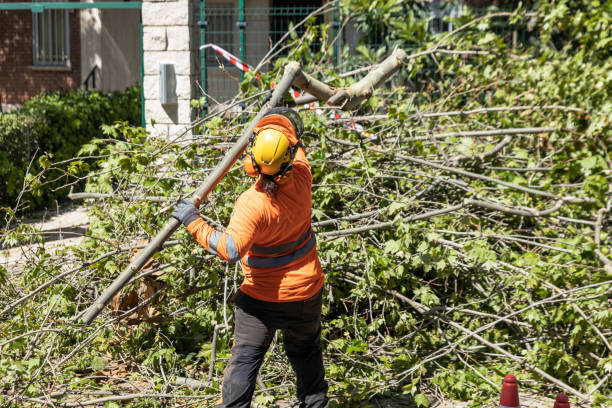Are you wondering what to do with the wood chips left behind after a tree removal? Well, you’re in luck! This article will explore some creative and practical ways to use those wood chips. From using them as garden mulch to incorporating them into your landscaping, there are plenty of options to consider. So, let’s dive in and discover how you can put those wood chips to good use!
When it comes to utilizing wood chips after tree removal, one of the most common and practical uses is as garden mulch. By spreading a thick layer of wood chips around your plants, you can help retain moisture in the soil, suppress weed growth, and regulate soil temperature. Not only does this save you time and effort in watering and weeding, but it also adds a natural and attractive aesthetic to your garden. Plus, as the wood chips break down over time, they contribute valuable organic matter to the soil, enhancing its fertility. So, why not put those wood chips to work and give your garden a healthy boost?
Utilizing Wood Chips as Garden Mulch
You can efficiently utilize those wood chips as garden mulch, creating a natural and sustainable way to nourish your plants. Sustainable gardening practices are becoming increasingly popular, and using wood chips as mulch is a great way to contribute to this eco-friendly movement. Not only does it provide a natural and organic covering for your garden beds, but it also offers numerous benefits for your plants.
One of the main benefits of using wood chips as mulch is its ability to retain moisture in the soil. Creating a layer of wood chips on top of the soil can help prevent evaporation and keep your plants hydrated for longer periods. This is especially important when water conservation is crucial during hot and dry summers. Additionally, the wood chips act as a barrier, preventing weed growth and reducing the need for excessive weeding.
Another advantage of using wood chips as mulch is its ability to regulate soil temperature. During extreme weather conditions, such as scorching heat or cold, wood chips act as insulation, protecting the roots of your plants from temperature fluctuations. This ensures your plants stay healthy and thrive, even in challenging weather conditions.
Furthermore, as the wood chips slowly decompose, they release nutrients into the soil, enriching it and providing a steady source of nourishment for your plants. This eliminates the need for chemical fertilizers, making it a more sustainable and environmentally friendly choice for your garden. Using wood chips as mulch can promote healthy plant growth while reducing your carbon footprint.
Utilizing wood chips as garden mulch is a fantastic way to practice sustainable gardening. The benefits of using wood chips as mulch, such as moisture retention, weed suppression, temperature regulation, and nutrient enrichment, make it an excellent choice for nourishing your plants naturally. So next time you have wood chips after tree removal, consider using them as mulch for your garden beds and contribute to a more eco-friendly and sustainable gardening practice.
Creative Uses for Wood Chips in Landscaping
Transform your outdoor space into a breathtaking oasis with the versatile beauty of landscaping designs incorporating these natural and rustic additions. One creative use for wood chips in landscaping is to create wood chip pathways. These pathways add an interesting visual element to your garden and provide a practical function by allowing you to navigate through your outdoor space without damaging the grass or soil. Wood chip pathways can be designed in various patterns and customized to fit your landscape’s style and aesthetic.
Another useful application of wood chips in landscaping is for erosion control. If you have areas in your yard prone to erosion, such as sloping terrain or areas with heavy foot traffic, wood chips can be a cost-effective and environmentally friendly solution. By spreading a layer of wood chips over these vulnerable areas, you can help prevent soil erosion by providing a protective barrier. Wood chips absorb water and slow its movement, preventing it from carrying away the soil and causing damage to your landscape.
In addition to their practical uses, wood chips can be used in landscaping to create visual interest and add a rustic touch to your outdoor space. Wood chips can create borders around flower beds or decorative mulch areas around trees and shrubs. Wood chips’ natural color and texture can complement various plantings and add a cohesive look to your landscape design. Whether you choose to use wood chips for their functional benefits or their aesthetic appeal, incorporating them into your landscaping can elevate your outdoor space’s overall look and feel.
Considerations for Mulching with Wood Chips
Enhance the beauty and health of your garden by mulching with wood chips, creating a protective layer around your plants that retains moisture, suppresses weeds, and adds a natural touch to your landscape. Wood chips are an excellent option for erosion control in your garden. When heavy rains or strong winds occur, the wood chips act as a barrier, preventing soil from being washed away and helping to stabilize the ground. This is especially beneficial for sloping areas or areas prone to erosion.
There are a few tips to keep in mind to compost wood chips effectively. First, it’s important to mix the wood chips with other organic materials, such as grass clippings or vegetable scraps. This will help balance the carbon-to-nitrogen ratio and speed up the decomposition process. Additionally, turning the compost pile regularly will ensure proper aeration and help break down the wood chips faster.
Another tip is to avoid using fresh wood chips in your compost. New wood chips contain high levels of carbon, which can deplete nitrogen from the soil as they decompose. It’s best to let the wood chips age for a few months before incorporating them into your compost. This will allow them to break down and release nutrients more effectively.
Mulching with wood chips offers numerous benefits for your garden, including erosion control and moisture retention. When composting wood chips, remember to mix them with other organic materials and give them time to age before using them in your compost. Following these tips, you can make the most of your wood chips and contribute to a healthy, thriving garden.

